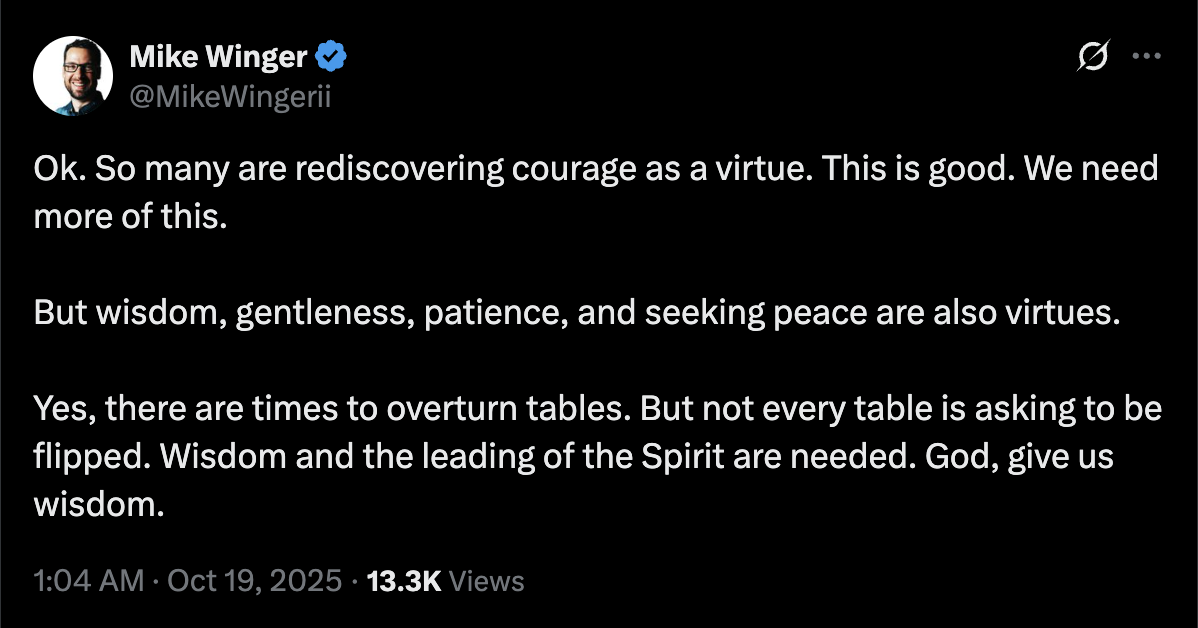Publicly Telling the Truth in Love

A Confession of Sin
Brothers and sisters in Christ, I write this confessing my own sin of passivity and shame. For too long, I’ve hesitated to speak the truth boldly, fearing offense to others more than I fear God Himself. As Proverbs 29:25 warns, "The fear of man lays a snare, but whoever trusts in the Lord is safe." Like Peter, who denied Jesus three times out of fear for his own safety (Luke 22:54-62), I have submitted to that snare, prioritizing the approval of man over obedience to my Savior. Yet, through Christ’s grace, Peter became a bold witness, proclaiming the gospel without fear (Acts 4:13). Likewise, we must repent of our fearfulness, embracing our identity in Christ, not as cowards, but as ambassadors of His kingdom (2 Corinthians 5:20). From this identity flows a duty to love our neighbors by proclaiming what is true and good, even when it costs us.
The Biblical Call to Speak Truth in Love
Ephesians 4:15 instructs us to "speak the truth in love," growing up into Christ, the head of the body. This is not an option. It is the outpouring of our union with Him. In a world marred by brokenness and darkness, Christians are called to be salt and light (Matthew 5:13-16), actively engaging society not out of fleshly zeal, but from the overflow of Christ's love in us.
Yet, as Wyatt Graham aptly notes, "What has become more complicated is how to love our neighbors concretely when society grows increasingly intolerant of Christian ideas." Indeed, the darkness shaping our culture demands our response. We cannot remain silent while lies masquerade as truth, for silence in the face of evil is complicity. As Christians, we must submit to Scripture in calling us to live under Christ's lordship in all spheres of life, including the public square.
Lessons from Church History: Boldness in the Face of Opposition
The Bible gives us examples of God's people proclaiming truth publicly, often at great personal risk. Consider John the Baptist, who fearlessly called out the Pharisees and Sadducees as a "brood of vipers" (Matthew 3:7) in a public setting, preparing the way for Christ by exposing hypocrisy. Our Lord Jesus Himself even repeats this (Matthew 12:34) and taught firm truths in the open—on adultery (John 8:1-11), taxes (Matthew 22:15-22), and the weightier matters of the law (Matthew 23)—addressing religious leaders and crowds alike, where anyone could listen or overhear.
The apostles followed suit. Paul, writing under the inspiration of the Holy Spirit, declared unyielding truths in Romans 1, outlining God's wrath against ungodliness and the suppression of truth. This passage, which I include part of without apology or weaponization, is part of the gospel itself, the power of God for salvation (v16). It offends because it exposes our universal need for a Savior, but we must proclaim it courageously, for we too were once enemies of God, redeemed only by Christ's blood.
13 I do not want you to be unaware, brothers, that I have often intended to come to you (but thus far have been prevented), in order that I may reap some harvest among you as well as among the rest of the Gentiles. 14 I am under obligation both to Greeks and to barbarians, both to the wise and to the foolish. 15 So I am eager to preach the gospel to you also who are in Rome. 16 For I am not ashamed of the gospel, for it is the power of God for salvation to everyone who believes, to the Jew first and also to the Greek. 17 For in it the righteousness of God is revealed from faith for faith, as it is written, “The righteous shall live by faith.” 18 For the wrath of God is revealed from heaven against all ungodliness and unrighteousness of men, who by their unrighteousness suppress the truth. 19 For what can be known about God is plain to them, because God has shown it to them. 20 For his invisible attributes, namely, his eternal power and divine nature, have been clearly perceived, ever since the creation of the world, in the things that have been made. So they are without excuse. 21 For although they knew God, they did not honor him as God or give thanks to him, but they became futile in their thinking, and their foolish hearts were darkened. 22 Claiming to be wise, they became fools, 23 and exchanged the glory of the immortal God for images resembling mortal man and birds and animals and creeping things. 24 Therefore God gave them up in the lusts of their hearts to impurity, to the dishonoring of their bodies among themselves, 25 because they exchanged the truth about God for a lie and worshiped and served the creature rather than the Creator, who is blessed forever! Amen. 26 For this reason God gave them up to dishonorable passions. For their women exchanged natural relations for those that are contrary to nature; 27 and the men likewise gave up natural relations with women and were consumed with passion for one another, men committing shameless acts with men and receiving in themselves the due penalty for their error. 28 And since they did not see fit to acknowledge God, God gave them up to a debased mind to do what ought not to be done. 29 They were filled with all manner of unrighteousness, evil, covetousness, malice. They are full of envy, murder, strife, deceit, maliciousness. They are gossips, 30 slanderers, haters of God, insolent, haughty, boastful, inventors of evil, disobedient to parents, 31 foolish, faithless, heartless, ruthless. 32 Though they know God's righteous decree that those who practice such things deserve to die, they not only do them but give approval to those who practice them.
Furthermore, Paul proclaimed Christ in the public square at Mars Hill (Acts 17), confronting the idolatry of the Greeks. In his letter to Titus, Paul not only instructs on sound doctrine and godly living (Titus 2-3), urging believers to adorn the gospel in public view, but also boldly states a firm truth about the Cretans: "One of the Cretans, a prophet of their own, said, 'Cretans are always liars, evil beasts, lazy gluttons.' This testimony is true. Therefore rebuke them sharply, that they may be sound in the faith" (Titus 1:12-13, commentary here). Here, Paul publicly affirms—through inspired Scripture—a harsh cultural critique, even drawing from a pagan source, to call for sharp rebuke, all for the sake of spiritual health, correction, and faithfulness to Christ. This exemplifies speaking uncomfortable truths in love, not to condemn but to redeem and build up the body.
The early church embodied this. Claiming "Jesus is Lord" was a political statement defying Caesar, leading to martyrdom for figures like Ignatius of Antioch and Polycarp. They went to their deaths rather than recant, fueled by Christ's resurrection power.
Martin Luther nailed his Ninety-Five Theses publicly, sparking the Reformation. The Presbyterians pushed for the Westminster Confession of Faith in English parliament to reform the Church of England during the English Civil War, standing firm on sola Scriptura. The Bible itself is a public document, God's truth proclaimed to all nations.
We must think biblically before speaking, but not shrink back in fear of offense. As our church forebears were not ashamed, neither should we be.
The Church's Passivity and Its Consequences
Self-examining the church's role in society over the past 150 years reveals how passivity has harmed those around us. Philosophies rejecting Christian values—such as Darwin's evolutionism, Marx's materialism, and Sanger's eugenics—have invaded society, often unchallenged by believers. We've ceded ground in allowing Caesar to indoctrinate children in classrooms (e.g., transgenderism, sexual promiscuity, idolatry, heretical teaching like my world history teacher falsely claiming Jews, Muslims, and Christians worship the same God). We’ve allowed the secular world to define morality and policy apart from God’s standards, rather than proclaiming biblical truth.
This is not a call to weaponize Christianity against those around us. This is part of loving our neighbor. We must move beyond merely voting on policies to shaping the policy itself. Every policy reflects one's values over another, but is it grounded in the truth of Scripture? We must not take on a Hobbesian, Lockean, or utilitarian view of Christianity's relationship with society (John 8:36).
Fear of man must not silence us. What we as Christians affirm in private, we must also declare publicly, even if it offends fellow Christians or has the chance to ruin relationships as we must not compromise on truth. Humility demands we speak, inviting correction and conversation, rather than saying nothing.
A Modern Conviction: The Impact of Charlie Kirk's Death
The recent assassination of Charlie Kirk on September 10, 2025, has deeply convicted me. This Christian husband and father boldly proclaimed biblical principles, not from fleshly opinion, but rooted in Scripture. His death highlights the cost of courage, yet look at the fruit. There are countless souls being led to Christ because he feared God more than man and wasn't afraid to say it in the public square. Contrast cultural reactions to his death versus George Floyd's. This reveals how some Christians are succumbing to prideful unloving empathy, prioritizing not offending over truth:
- Jackie Hill Perry's Comments On Charlie Kirk
- Pastors Shaming Charlie Kirk in the Pulpit
- Toxic Empathy: How Progressives Exploit Christian Compassion
- Mike Kelsey Video
A Practical Example: Speaking Out on Moral Inequivalence
Recently, in response to Mike Winger's post (depicted below), I shared this on Instagram, observing the realities at hand:

Both the left and right sin, falling short of God's standard, leading to spiritual death, and as Christians, sin should be condemned on both sides. Yet, the left's policies, like those promoting abortion, more directly cause physical death and contradict biblical principles. Many leftist ideals stem from secular values that reject God's authority, leading to graver consequences than the sins of the right.
To clarify, my intent here is not to imply that some sins merit less of God's wrath than others. All sin, whether on the left or right, is an offense against our holy God and leads to spiritual death, redeemable solely through Christ's atoning blood (Romans 6:23). That said, Scripture does teach that sins vary in their temporal consequences in this life and degrees of judgment in the age to come, even as all merit eternal wrath if unrepented. This is not a diminishment of sin's gravity but a reflection of God's just character, as He punishes according to the knowledge, opportunity, and harm involved (Luke 12:47-48). Temporally, the Old Testament moral law, unchanged in its essence under the New Covenant (Chapter 19 LBCF), reveals differing societal impacts and penalties. For instance, murder demands death (Exodus 21:12), while theft requires restitution (Exodus 22:1–4), showing God's concern for both the sinner's heart and the ripple effects on neighbors. This moral law, written on the human conscience and fulfilled in Christ, continues to bind us as a rule of righteousness (Romans 13:8–10), guiding civil justice without imposing the full Mosaic judicial code on nations today.
My point is, in the application of biblical ethics to politics—as part of loving our neighbor (Matthew 22:39)—I'm observing that leftist policies (e.g., socialism, abortion, open borders, lenient punishment of evildoers) pushed by those who currently hold political offices, often cause greater temporal harm, widespread innocent death and societal decay, than right-leaning sins like hypocrisy or legalism. Many leftist ideals trace to God-rejecting roots, echoing Satan's deceptions in allegories like Brave New World, 1984, or That Hideous Strength. The right, while flawed and sometimes idolatrous (e.g., nationalism over Christ), generally aligns closer to biblical values like life and justice but misses the mark in pride or exclusion.
This isn't novel. Especially after Kirk's death, there are a number of faithful Christians who are convicted and biblically examining these issues, speaking out in courage to the culture and politics, for the sake of leading lost souls to Christ.
Conclusion: Boldness Rooted in Christ
Brothers and sisters, I state this with humility, as I grow more vocal online and in public, I'll err along the way, and invite correction. But I'd rather speak the truth than remain silent on the matters that truly affect those around me. Non-believers benefit from seeing Christians interact truthfully, modeling the gospel and the life we are called to in Christ. Let us reject passivity, embracing our identity in Christ, the One who spoke truth, rising victorious over death. May we, by His grace and wisdom, tell the truth in love, for His glory and our neighbors' good.

If you would like to respond, feel free to email or message me. My communication channels are on my homepage. As I've had to do myself, I encourage examining the resources provided, testing them against Scripture, and holding fast to what is good (1 Thessalonians 5:20-21).
- Samuel James – How Great the Chasm That Lay Between Us
- TGC Samuel James – Experiences Shape Beliefs
- Brian Li – When the World Can't Win the Argument
- Samuel Sey – Evangelicals for Harris: Evangelicals for Satan?
- Wyatt Graham – We Must Courageously Love Justice
- Mike Winger – Why I Deeply Respect Charlie Kirk
- Mike Winger – Our Hostile Culture
- Samuel James – Accelerants and Tethers
- Allie Beth Stuckey – 1 Conservative Christian vs 20 Liberal Christians
- Stephen Wellum – An Essay on the Degrees of Sin
- Justin Perdue – A Response to Theonomy
- TGC Justin Dillehay – Continuity of Moral Law
- John Fry – An Exegetical Study of Hebrews 10
- John Gill – Commentary of Scripture
- Wiker – 10 Books That Screwed Up the World
- Huxley – Brave New World
- Orwell – 1984
- Lewis – That Hideous Strength